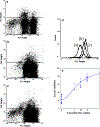Pharmacokinetic and pharmacodynamic study of tariquidar (XR9576), a P-glycoprotein inhibitor, in combination with doxorubicin, vinorelbine, or docetaxel in children and adolescents with refractory solid tumors
- PMID: 26486517
- PMCID: PMC7751951
- DOI: 10.1007/s00280-015-2845-1
Pharmacokinetic and pharmacodynamic study of tariquidar (XR9576), a P-glycoprotein inhibitor, in combination with doxorubicin, vinorelbine, or docetaxel in children and adolescents with refractory solid tumors
Abstract
Purpose: P-glycoprotein (Pgp), an ATP-dependent transport protein, confers multidrug resistance in cancer cells. Tariquidar binds and inhibits Pgp. To assess the toxicity, pharmacokinetics (PK), and pharmacodynamics of tariquidar, we conducted a phase I trial of tariquidar in combination with doxorubicin, docetaxel, or vinorelbine in children and adolescents with recurrent or refractory solid tumors.
Methods: Patients less than 19 years of age with refractory or recurrent solid tumors were eligible. Tariquidar (1, 1.5, or 2 mg/kg) was administered alone and in combination with doxorubicin, docetaxel, or vinorelbine. PK of tariquidar and cytotoxic drugs was performed. Pgp function was assessed by a rhodamine efflux assay and (99m)Tc-sestamibi scintigraphy. Tumor Pgp expression was assessed by immunohistochemistry. Response was assessed using Response Evaluation Criteria in Solid Tumors.
Results: Twenty-nine subjects were enrolled. No tariquidar-related dose-limiting toxicity (DLT) was observed. DLT related to cytotoxic drugs occurred in 12 % of subjects receiving tariquidar 2 mg/kg. When administered in combination with tariquidar, the clearance of docetaxel and vinorelbine was reduced compared to prior studies. Inhibition of rhodamine efflux was dose dependent. After tariquidar administration, (99m)Tc-sestamibi accumulation in tumor increased by 22 %. Objective responses (1 complete, 2 partial) were observed. There was no association between tumor Pgp expression and response.
Conclusion: A tolerable and biologically active dose of tariquidar was established in children and adolescents. This trial demonstrates that modulators of resistance can be evaluated in combination with chemotherapy, and pharmacokinetic and pharmacodynamic endpoints can be useful in determination of recommended dose in children and adolescents.
Trial registration: ClinicalTrials.gov NCT00011414.
Keywords: Multidrug resistance; P-glycoprotein; Pediatric cancer; Pharmacokinetics; Phase I.
Conflict of interest statement
Compliance with ethical standards
Figures



Comment in
-
Understanding the role of tariquidar, a potent Pgp inhibitor, in combination trials with cytotoxic drugs: What is missing?Cancer Chemother Pharmacol. 2016 Nov;78(5):1097-1098. doi: 10.1007/s00280-016-3044-4. Epub 2016 May 13. Cancer Chemother Pharmacol. 2016. PMID: 27178178 No abstract available.
Similar articles
-
A phase I study of the P-glycoprotein antagonist tariquidar in combination with vinorelbine.Clin Cancer Res. 2009 May 15;15(10):3574-82. doi: 10.1158/1078-0432.CCR-08-0938. Epub 2009 May 5. Clin Cancer Res. 2009. PMID: 19417029 Free PMC article. Clinical Trial.
-
A pharmacodynamic study of docetaxel in combination with the P-glycoprotein antagonist tariquidar (XR9576) in patients with lung, ovarian, and cervical cancer.Clin Cancer Res. 2011 Feb 1;17(3):569-80. doi: 10.1158/1078-0432.CCR-10-1725. Epub 2010 Nov 16. Clin Cancer Res. 2011. PMID: 21081657 Free PMC article. Clinical Trial.
-
Increased 99mTc-sestamibi accumulation in normal liver and drug-resistant tumors after the administration of the glycoprotein inhibitor, XR9576.Clin Cancer Res. 2003 Feb;9(2):650-6. Clin Cancer Res. 2003. PMID: 12576431 Clinical Trial.
-
Docetaxel in combination with doxorubicin or vinorelbine.Eur J Cancer. 1997 Aug;33 Suppl 7:S20-2. doi: 10.1016/s0959-8049(97)90005-8. Eur J Cancer. 1997. PMID: 9486099 Review.
-
Tariquidar (XR9576): a P-glycoprotein drug efflux pump inhibitor.Expert Rev Anticancer Ther. 2007 Apr;7(4):447-59. doi: 10.1586/14737140.7.4.447. Expert Rev Anticancer Ther. 2007. PMID: 17428165 Review.
Cited by
-
A novel pharmacotherapy approach using P-glycoprotein (PGP/ABCB1) efflux inhibitor combined with ivermectin to reduce alcohol drinking and preference in mice.Alcohol. 2020 Aug;86:1-8. doi: 10.1016/j.alcohol.2020.03.013. Epub 2020 Apr 8. Alcohol. 2020. PMID: 32278067 Free PMC article.
-
15-0600-Dr. Fox's response to letter to the editor.Cancer Chemother Pharmacol. 2016 Nov;78(5):1099-1100. doi: 10.1007/s00280-016-3162-z. Epub 2016 Oct 11. Cancer Chemother Pharmacol. 2016. PMID: 27730303 Free PMC article. No abstract available.
-
Enhanced plasma and brain concentrations and medulloblastoma cytotoxicity of asciminib and nilotinib by P-glycoprotein inhibition with tariquidar.Anticancer Drugs. 2025 Sep 1;36(8):622-628. doi: 10.1097/CAD.0000000000001728. Epub 2025 Apr 18. Anticancer Drugs. 2025. PMID: 40279170
-
Recent Advancements and Strategies for Overcoming the Blood-Brain Barrier Using Albumin-Based Drug Delivery Systems to Treat Brain Cancer, with a Focus on Glioblastoma.Polymers (Basel). 2023 Oct 2;15(19):3969. doi: 10.3390/polym15193969. Polymers (Basel). 2023. PMID: 37836018 Free PMC article. Review.
-
Early Mechanisms of Chemoresistance in Retinoblastoma.Cancers (Basel). 2022 Oct 10;14(19):4966. doi: 10.3390/cancers14194966. Cancers (Basel). 2022. PMID: 36230889 Free PMC article.
References
-
- Agrawal M, Abraham J, Balis FM, Edgerly M, Stein WD, Bates S, Fojo T, Chen CC (2003) Increased 99mTc-sestamibi accumulation in normal liver and drug-resistant tumors after the administration of the glycoprotein inhibitor, XR9576. Clin Cancer Res 9:650–656 - PubMed
-
- Arceci RJ (1993) Clinical significance of P-glycoprotein in multidrug resistance malignancies. Blood 81:2215–2222 - PubMed
-
- Arceci RJ (2000) Can multidrug resistance mechanisms be modified? Br J Haematol 110:285–291 - PubMed
Publication types
MeSH terms
Substances
Associated data
Grants and funding
LinkOut - more resources
Full Text Sources
Other Literature Sources
Medical
Miscellaneous

